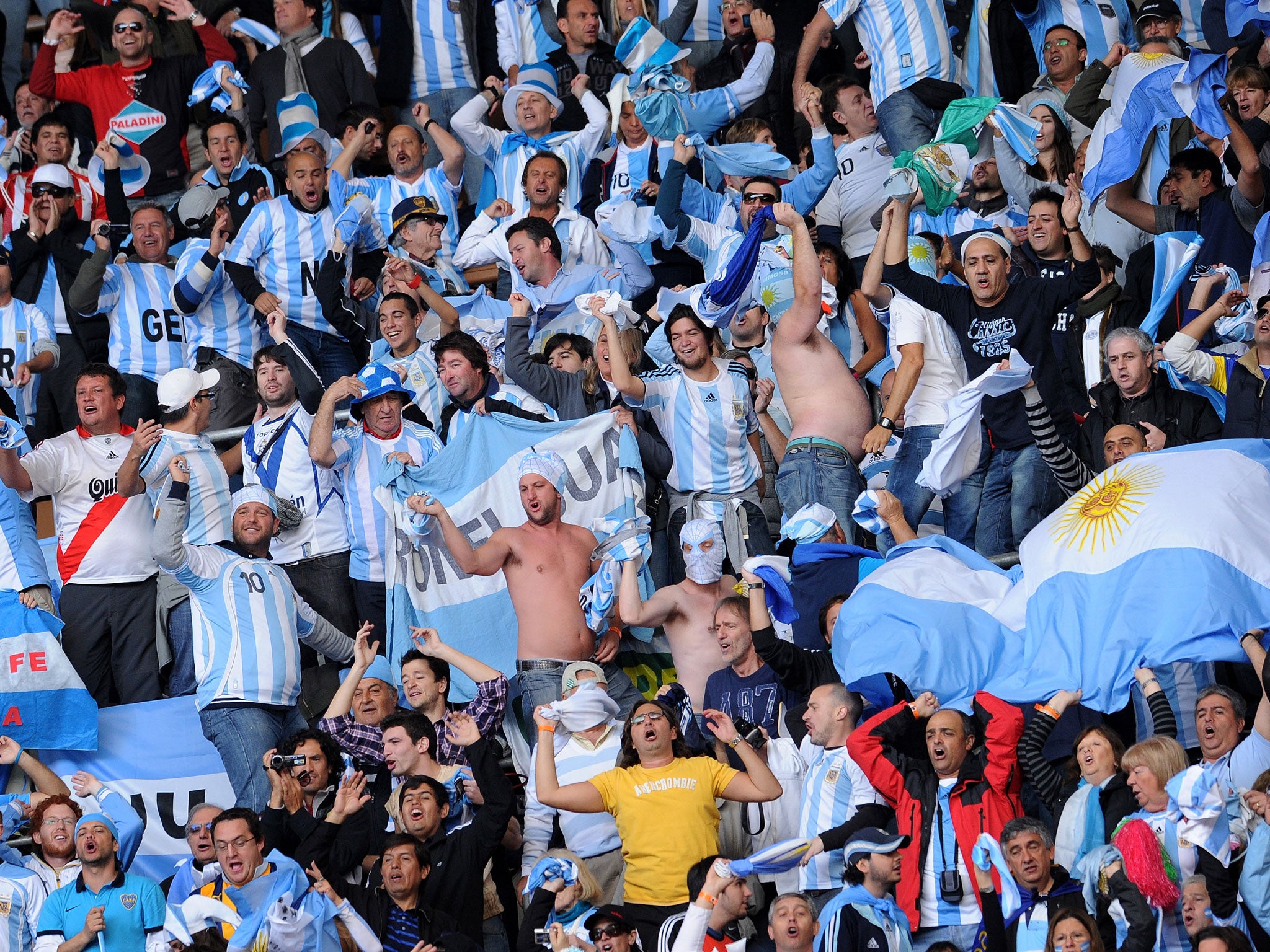World Cup 2014: Inside the mad, murky world of Argentina’s hard-core supporters

Like most Argentines, there are two teams Pato supports when it comes to international football: Argentina and whoever Brazil is playing against.
Brazilians share similar sentiments but obviously in reverse. When asked recently who he would like to see win the World Cup, Pele replied: “Brazil or anyone but Argentina. If they won, it would be the worst thing for most Brazilians.”
Along with around 20,000 of his compatriots, Pato, short for Patricio, has arrived in Rio de Janiero for Argentina’s opening match against Bosnia-Herzegovina tonight in the Maracana, hoping to make Brazil’s worst nightmare come true.
Nothing would give them greater pleasure than winning the World Cup in the enemy’s back yard. Indeed, the concensus among many is that it would be even better than winning it on home soil.
“Once and for all, we would be able to shut these Brazilians up,” said Pato.
This is a football rivalry in the purest sense that is not underpinned by any major political or historical issues, as so many are. Despite being neighbours, the two countries share no common history or language, have only been to war once, in the early 1800s (which does not feature in the national consciousness of either nation), and enjoy friendly diplomatic relations. When it comes to matters on the pitch, however, it is an entirely different matter. Pele v Maradona; Messi v Neymar and countless controversial incidents over the years.
For World Cup organisers, while this intense rivalry adds extra spice to the tournament it is also proving to be a security concern.
In among the 60,000 Argentina fans who are expected to attend the team’s World Cup matches, there are fears that the notorious barra bravas, hard-core hooligans who orchestrate most of the violence within Argentine football, will be among them.
Argentine authorities have provided a list of 2,000 known barra bravas to their Brazilian counterparts to prevent them from entering the country during the tournament.
So far, only one has been refused entry.
Undercover Argentine police officers are also in Brazil to help identify those who may have sneaked across the border. Similar operations to prevent barra bravas from entering Brazil for matches involving Argentine sides in the Libertadores Cup, the continent’s premier club tournament, have regularly failed, resulting in violence.
It is hard to imagine the central role the barra bravas play in Argentine football culture. They are a toxic combination of football hooligans and organised mafia, controlling the sale of fast food and drugs within football grounds. They never pay to get into stadiums and it is not uncommon for them to have their travel to away games paid by clubs. This often includes matches involving the national team.
I first met Pato in the early 1990s when I lived in Buenos Aires and faithfully attended Boca Juniors matches. He was part of the inner circle of the Boca barra brava, which at the time was led by El Abuelo, The Grandfather, who was a celebrity in his own right.
With his thick mane of grey hair, beaming smile and aged in his sixties, El Abuelo was the most unlikely of hooligan godfathers. He would make grand entrances into La Bombanera, Boca’s home ground, with Pato and up to 200 others dutifully walking behind, carrying flags and beating drums. The crowd would chant his name, fans queued up to hug him and he would often socialise with club officials and politicians. When popular players were dropped, El Abuelo would meet with the manager to voice his disapproval.
Brazilians aside, for most barra bravas the other No 1 enemy is the English. They still talk proudly of how they fought them in the Aztec stadium during the 1986 World Cup “Hand of God” game, seizing their flags.
“We are unlikely to play the English in this tournament because we can only meet them in the semi-final or final and I can’t see that happening,” jokes Pato.
He refuses to believe me when I tell him that English football culture has changed and that Argentina’s barra bravas are unlikely to encounter the type of English hooligans they came across in Mexico 1986 at Brazil 2014. However, it is difficult to challenge his scepticism on England progressing to the latter stages of the tournament.
In early 2000, El Abuelo was convicted of murder and then killed himself while in prison, leading Pato to “retire”, as he puts it, barra brava life.
Today, he just counts himself as a passionate football fan, although he admits to keeping up to date with all the latest intelligence on the barra bravas.
If Argentina and Brazil both win their groups, then they can only meet in the final in the Maracana, which for Pato is a mouth-watering prospect.
ARGENTINA: Group F team profile
Show all 5He proposes a toast: “To Argentina and El Abuelo. May he Rest in Peace.”
Subscribe to Independent Premium to bookmark this article
Want to bookmark your favourite articles and stories to read or reference later? Start your Independent Premium subscription today.

Join our commenting forum
Join thought-provoking conversations, follow other Independent readers and see their replies